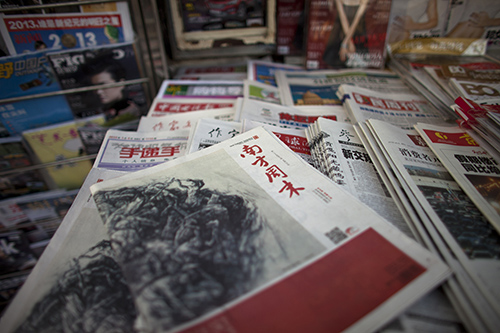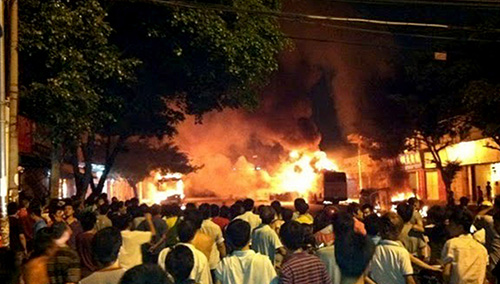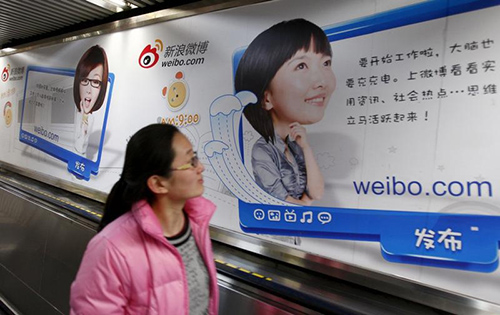When journalists at the Guangdong-based Southern Weekly found that their 2013 new year editorial had been changed, without their knowledge, to exalt the virtues of the Communist Party, they took their outrage to the Chinese microblogging site Weibo.
The popular social media site often provides a platform for journalists and Chinese citizens to discuss news and contentious issues that mainstream press are barred from reporting on. A set of documents provided to CPJ by a former employee in Weibo’s censorship department however, sheds light on how the site must tread a fine line between appeasing government censors and encouraging users to keep posting to its site.
Included in the several hundred pages of censorship logs are orders that show how Weibo reacted to the Southern Weekly story as a growing number of citizens–from lawyers, academics and students to migrant workers and celebrities–took to the site to voice support for the journalists.
The documents account for most of the internal orders of Weibo censorship departments between April 2011 and late 2014, according to the former employee, who asked not to be identified for fear of repercussions. Each document, usually a couple of pages long, contains the censorship orders of a day shift (10 hours) or a night shift (14 hours). The former employee, who said he left Weibo because he felt his job was “maleficent,” told CPJ he collected the logs so “people can study [them].”
When contacted by CPJ for verification of the authenticity of the documents, a representative from Sina, Weibo’s parent company, said, “We do not verify any documents that are not official.” When CPJ contacted Sina’s headquarters in Beijing for comment at the end of February a spokeswoman said the company did not have anyone who could respond to CPJ’s questions.
The Southern Weekly incident led to one of the biggest standoffs over press freedom in China in recent years. Journalists at the newspaper used Weibo to demand the resignation of Tuo Zhen, the head of the Guangdong propaganda department who allegedly ordered the editorial to be changed. Some went further and staged a strike. Citizens showed their support to the journalists not only on Weibo, but also offline–a couple of hundred gathered outside the headquarters of the Southern Weekly with placards condemning censorship and demanding press freedom.
With no public comment by the propaganda department, and little reporting of it in China’s press, Weibo became the main outlet where details of the incident were reported and commented on. But the grip of China’s censors was still felt at the microblogging site.

On January 3, 2013–the day the altered editorial was published–the censorship logs record instructions given by managers of Weibo’s censorship department to its employees: “Please concentrate on checking and clearing posts related to attacking the director of the Guangdong Provincial Propaganda department. This is the focus of today’s work…Posts instigating his resignation should also be censored. Ordinary mentions and ordinary negative posts do not need to be censored.”
The order corresponded to a purported censorship directive from the Central Propaganda Department, also dated January 3, 2013 and published in China Digital Times, which ordered “all reporters and editors not to discuss the Southern Weekly New Year editorial on any public platforms.”
On January 7, 2013 China Digital Times published another censorship order, attributed as coming from the Central Propaganda Department, in which the department allegedly ordered media outlets to ensure journalists did not voice support for Southern Weekly and to reprint an editorial by the Communist party-owned newspaper Global Times toeing the official line. An entry in the Weibo censorship logs on the same day read, “Maintain the same level of censorship [as in previous days], mainly make posts unable to be shared. To those extreme posts that attack the party, leaders, and calling for protests, make them invisible. Do not overkill.”
Making posts “invisible” is different from deleting posts. When a post becomes invisible, it can be viewed only by the person who wrote it, leaving the user unaware that his or her post has, in effect, been taken down. A November 2014 study by the University of Toronto’s Citizen Lab, which tested a sample of sensitive keywords over two days to see how Weibo posts are censored, and the logs viewed by CPJ show this is one of the site’s most frequently applied censorship methods.
On January 9, the publisher of the Beijing News, a similarly outspoken publication based in the country’s capital, threatened to resign when pressured by party officials to comply with the January 7 censorship order to reprint the Global Times article, according to reports. An entry in the Weibo logs on the same day, referencing the news of his resignation, said, “This must be completely killed.”
In the week after the Southern Weekly news broke, CPJ found several entries similar to the above-mentioned ones instructing rank and file employees on the particulars of censorship.

While the logs are a record of the censorship department managers’ orders to the employees, the source of the orders came from a government relations specialist at Sina who served as a middle man between the government and Sina’s censorship department, according to the former employee. The specialist received censorship orders from various government agencies via channels such as the messaging apps QQ and WeChat and conveyed them to managers in the censorship department. “Those orders are usually clear, direct and urgent, like whose accounts need to removed and which posts need to be deleted,” the former employee said. “The Cyberspace Administration of China is the highest authority to Internet companies, but even the Ministry of Agriculture has the power to order us to remove posts.” The former employee added: “The specialist also frequently goes to government meetings to study the ‘spirit of [other larger] meetings,’ which are broad censorship guidelines. He then gives us some very vague orders. The censorship documents I sent you included both kinds of censorship orders.”
In most cases, before members of the censorship department work on posts Sina’s computer system scans each post using an algorithm designed to identify politically unacceptable content, according to the former employee. Posts are flagged by the algorithm and forwarded to the department’s employees, who decide their fate based on the instructions listed in the censorship logs. The logs also include instructions on how employees should categorize censored Weibo accounts, to help Sina analyze its data. For example, when censoring accounts that had posts related to the Southern Weekly case, employees were told to click the tabs “Southern Weekly” and “politics.” Over a 24-hour period, about 3 million posts would be processed, according to Reuters which interviewed four former Weibo censors in 2013. In 2011, around 100 million posts a day were made on Weibo, the state-run news agency Xinhua reported.
The censorship logs viewed by CPJ provide insight into the workings of Weibo’s then approximately 150-member censorship team. They show how government directives were received, processed, and executed within Weibo, and hint at Sina’s struggle in balancing satisfying the government’s censorship demands with maintaining user activity level.
User activity is the lifeline of any social media company. Censorship brings down the activity level and drives users away because they are less able to engage. If a Chinese Internet company does not follow government censorship orders closely, it runs the risk of being severely punished. The case of Fanfou, which was highlighted in CPJ’s 2013 report “Challenged in China,” underlines this risk. Fanfou, the country’s earliest microblogging platform, was closed down for 16 months in 2009-10 after its users posted information about riots in Urumqi in the restive region of Xinjiang.
While orders from the Chinese authorities were mostly about stopping the dissemination of certain news items, the censorship logs show the department’s managers weighed in on the specifics. For example, if making a post unable to be shared was sufficient in limiting the spread of news, then they didn’t issue orders to make it invisible. If temporary suspension of an account was enough for cowing the user into political obedience, then they didn’t issue orders to remove it. In the Southern Weekly case, a January 4 entry informed employees to not be stricter in their censorship than Tencent, Sina’s then competitor in the microblogging market in China. The entry suggests that Sina was aware heavy censorship could drive users to competitors.

Such nuanced censorship of news can be seen throughout the logs. For example, after a clash between street vendors and security guards in Guangzhou, a June 13, 2011 entry read, “Positive content, official reporting, stories on police bravery, calls for peace, posts asking for help in emergency–do not touch on any of these. Using the chance to instigate chaos, saying that the government first opened fire, rumor mongering that the pregnant woman had already died–censor [them]. As to those posts that have a large number of forwards and you are not sure what to do, ask your supervisor. Those who post video clips, make them invisible. Those only narrate the case or live blog about it, if forwards numbers are low, make them unable to be shared first.”
Not all news events warrant such complex censorship. The most politically sensitive issues require the most stringent censorship, such as news related to conflicts in Xinjiang. A July 18, 2011 entry, which refers to an armed attack in a police station in Hotan in which several security force officers and hostages died, said, “All the nonsense and posts pointing at ethnic policies and the police, censor them resolutely! If they are just reposts of [official] news, pass. This is today’s big thing. The police are watching. Everyone, be careful.”
Given the depth and breadth of Weibo censorship, it is likely that many of the site’s monthly active users, around 220 million, have been affected by its censors at some point. For journalist Liu Hu however, not only was he the apparent victim of Weibo censorship, he was also imprisoned over his posts on the site.
In August 2013, CPJ documented how Liu, then a reporter for the Guangdong-based newspaper New Express, was arrested for “fabricating and spreading rumors” for accusing several government officials of corruption in Weibo posts. In September 2015, after a year in prison, numerous interrogations, and coming under pressure to give confessions on state television, police dropped the charges against him due to “insufficient evidence.” In December, the same month that Liu applied for compensation for wrongful imprisonment, the Beijing prosecutor’s office rescinded the “insufficient evidence” decision, and ruled that he had committed “minor crimes,” a classification that makes him illegible for compensation, according to Radio Free Asia.
Liu told CPJ that during the past two and half years he has been trying to have his case heard by the public, but Weibo censorship had made that difficult. “I have had at least five Weibo accounts removed. Some just disappeared for no reason. I can be muzzled at any time,” Liu said.
CPJ showed Liu two entries in the Weibo censorship logs that appear to order posts about news related to his arrest, including negative references about the police and government to be censored. When asked to comment on Sina’s apparent censorship of his case, Liu paused for a moment before saying, “I don’t want to talk about it. It’s stifling.”
Attempts by CPJ to contact Sina for comment on Liu’s case were not successful.
As online censorship tightens, the idea of Weibo being a transformative force for freedom of information has been repeatedly challenged by experts who study Chinese social media.
Perhaps nothing is more emblematic of the current state of press freedom in China than the epilogue to the Southern Weekly protest: In July 2015, Tuo, Guangdong’s propaganda chief who allegedly orchestrated the changes to the editorial, was promoted to deputy head of the Central Propaganda Department. And in November 2015, Guo Feixiong, Liu Yuandong, and Sun Desheng–who joined the protest outside the newspaper’s headquarters–were sentenced to six, three, and two and a half years in prison respectively for “assembling a crowd to disrupt public order,” Amnesty International reported.
